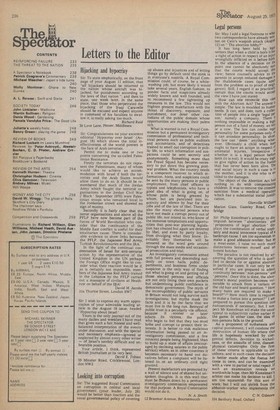Looking into corruption
Sir: The suggested Royal Commission on corruption in central and local government (your leader, July 28) would be better than inaction and the usual governmental policy of covering
up abuses and injustices and of letting things go by default until the stink is in everyone's nostrils. A Royal Commission could, of course, be a white
washing job; but more likely it would take several years, English fashion, to ponder facts and suspicions already widely known and well founded, and to recommend a few tightening up measures in the law. This would not frighten present malefactors with the threat of discovery, exposure, and punishment, nor deter other custodians of the public domain whose opportunities are making their palms itch.
What is wanted is not a Royal Com mission but a permanent investigatory commission of professional and technical persons such as public auditors and accountants, and of detectives trained to smell out corruption in public life, to which information and suspicions could be sent secretly and anonymously. Something more than the Fraud Squad has become necessary to put down this growing postwar problem. What the country needs is a competent receiver to which information, hints, and suspicions could be sent by the many persons in public employment, from chief officers to typists and telephonists, who have a good idea of what is going on, of whose palm is being greased by whom, but are paralysed into inactivity and silence by fear for their jobs and of the law of libel. There are also the many elected persons who have not made a corrupt penny out of public life, nor intend to, who know of the immense temptations and opportunities that post-war planning legislation has created but again are deterred by libel, and even by party loyalty, from divulging what they know. Inevitably they themselves will be smeared as the word gets around through the mass media and occasional prosecution and trial.
An investigatory commission armed with full powers and descending suddenly on town halls, public departments, and business firms under suspicion is the only way of finding Out what is going on and getting rid of those elected persons and officials are not only lining their own pockets but undermining public confidence in democratic government. The myth of the incorruptibility of public servants in Britain would not long survive such investigations; but myths mask the facts and it is by the facts that we must live in the long run. Betrayal of public trust is a peculiarly vile offence, because it -sooner or later infects its victims, the public, who begin to feel that they too must bribe and corrupt to protect their interests. It is better to risk malicious information being passed to an investigatory commission, and a few innocent people being frightened, than to build up a state of affairs (encouraged by declining salaries in the public service) where, as in other countries it becomes necessary to hand out do. natives before a complaint will be listened to or an ordinary civil right granted.
Present malefactors are protected by a wall of silence and of shared but un: spoken thoughts. It is this wall that must be 15roken down by a permanent investigatory commission empowered for that purpose. A Royal Commission would not do it, N. A. Smith 12 Braemar Avenue, Bournemouth


































 Previous page
Previous page